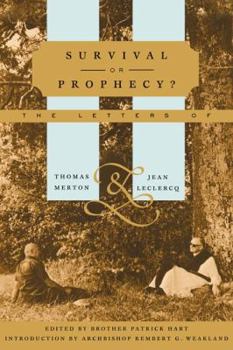Survival or Prophecy?: The Letters of Thomas Merton and Jean LeClercq
Introduction by Archbishop Rembert G. Weakland. Two monks in conversation about the meaning of life and the nature of solitude. Thomas Merton, the American Trappist monk who wrote The Seven Storey... This description may be from another edition of this product.
Format:Hardcover
Language:English
ISBN:0374272069
ISBN13:9780374272067
Release Date:June 2002
Publisher:Farrar Straus Giroux
Length:224 Pages
Weight:0.88 lbs.
Dimensions:0.8" x 5.8" x 8.6"
Customer Reviews
1 rating
When a militaryman takes over a monastery, holy obedience is first to flee
Published by Thriftbooks.com User , 16 years ago
The Obedience described by Saint Benedict is based in consensus and discernment of gifts and abilities and callings and weaknesses. Saint Benedict ever calls for consideration for the weak, the elderly, the infirm, and above all that none may lose heart. In fact Obedience is not a Benedictine vow, but Stability, Poverty and the conversion of ways. Humility is an ideal to work towards assiduously, and the path upon which we travel. The Abbot finds who bears the proper charisma and abilities to bear certain offices and responsibilities, and frees each one in his charge to their true vocation in a process of liberation ("obedient and free" as Father Leclercq here writes) to the spirit. In fact in this book we often read of spiritus libertatis: the liberty of the spirit, or the spirit of liberty. Thus when military men returned from the SEcond World War to take over our monasteries as seemingly fitting to their customary and severe regime, they had no idea what they were doing and turned monks into their slaves, to take orders without question but with joy. This is not the spirit and the rule of Saint Benedict, who humbly saw his as a rule for beginners, and better to follow that of the great Saint Basil. With the military regime in place the monastery become not the angelic and liberating path to heaven but a cruel Trap. Thus this fragmentary record of correspondence reads like an inexorable and tragic novel of opportunities for spiritual growth purposefully and seemingly maliciously and carelessly cut off by ignorant authorities, like something out of Gogol, without the dreamy madness of Kafka, but much as his The Trial, in which incomprehensible and unappealable but grotesquely unjust and life-destroying decisions are made by nebulous and all-powerful absent authorities. Merton was nearly self-taught as a Catholic, even after his entrance into the monastery, where he read and studied and meditated his reading without end. These letters reveal him at the intellectual and spiritual level of the great European monks of Saint Benedict, but without their rich and deep seed bed in which to sprout and to grow. He had to do it all on his own, at great cost and effort, and unimaginable agony as he confronted the hard wall of the inexperienced and superficial American monastic life, under an unbending military officer, as if in Kafka's The Penal Colony: Stories and Short Pieces, an officer moreover with little perception of the true monastic vocation and the way of the hermit, the first and greatest of Christian monks. Thus his European correspondent can merely stand by baffled at the purposeful destruction and frustration of all of Merton's true and holy monastic aspirations, at the unfeeling and senseless rubbing out of his great vocation. Had Merton been free to live out the vocation God planted in his fruitful heart and soul, for one thing he would still be alive, and for another, so would American monachism. Many observers note his return to Geths




